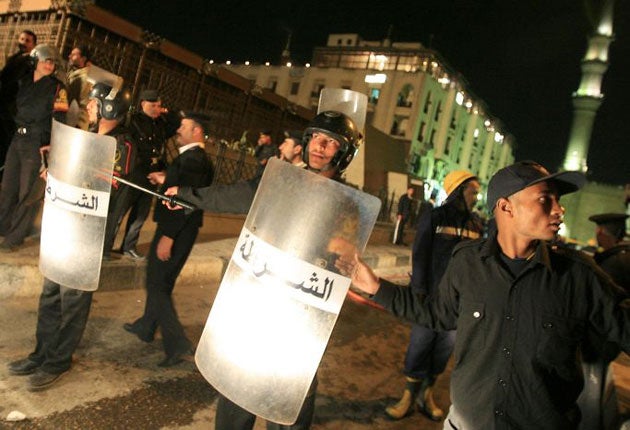Tourists targeted in Cairo market bombing

Your support helps us to tell the story
From reproductive rights to climate change to Big Tech, The Independent is on the ground when the story is developing. Whether it's investigating the financials of Elon Musk's pro-Trump PAC or producing our latest documentary, 'The A Word', which shines a light on the American women fighting for reproductive rights, we know how important it is to parse out the facts from the messaging.
At such a critical moment in US history, we need reporters on the ground. Your donation allows us to keep sending journalists to speak to both sides of the story.
The Independent is trusted by Americans across the entire political spectrum. And unlike many other quality news outlets, we choose not to lock Americans out of our reporting and analysis with paywalls. We believe quality journalism should be available to everyone, paid for by those who can afford it.
Your support makes all the difference.The spectre of Islamist attacks returned to haunt Egypt’s security services last night after a French tourist was killed when a bomb ripped through the Khan el-Khalili bazaar in Cairo. According to Egyptian police, up to 22 people were injured, including 11 French, three Germans and several Egyptians.
“I was praying and there was a big boom and people started panicking and rushing out of the mosque, then police came and sealed the main door, evacuating us out of the back,” Mohammed Abdel Azim, who had been worshipping in the nearby Hussein Mosque, told the Associated Press. “We thought that Egypt was the only country safe from bombings.”
Khan el-Khalili is a major souk in Cairo’s old city and one of the capital’s big tourist attractions. Witnesses reported seeing blood on the marble paving slabs in front of the mosque. Some injuries may have been caused by shards of marble and stone. Reporters at the scene described chaos and confusion as riot police cordoned off the area and evacuated the mosque.
Police said the bomb, which according to some reports was thrown from a motorcycle, was probably home-made. They also said they safely detonated a second smaller explosive device roughly an hour after the first blast in the same area.
The Khan el-Khalili bazaar last came under attack in April 2005. On that occasion a suicide bomber killed two French visitors and an American. Tourist areas in Egypt have come under sporadic attack from Islamist militants in recent years. In 2005, more than 60 people, many of them foreigners, were killed in the Red Sea resort of Sharm el-Sheikh while other holiday spots in the Sinai Peninsula have also been targeted by suicide bombers.
Egypt waged a long struggle against Islamist militants who targeted foreign tourists through the 1990s. The worst single incident was a massacre of 58 foreigners and four Egyptians in Luxor in 1997. That attack was blamed on Jamaat al-Islamiya, a radical offshoot of the older and also banned Islamist movement the Muslim Brotherhood.
Jamaat mounted scores of other attacks on foreigners at the time on the grounds that they represented the contamination of Egypt by secularism and other Western cultural ideas. The group eventually became marginalised after a popular backlash as tourism slumped disastrously.
Tensions have risen in recent weeks amid criticism of the government over its handling of the Gaza conflict. President Hosni Mubarak has been mediating between Israel and the Palestinian factions but provoked fury among Israel’s critics by keeping the Rafah crossing, which links Egypt with Gaza, sealed off during the three-week war, thus making access for aid and the evacuation of wounded civilians more difficult.
Egypt has come under persistent pressure from its allies to allow moderate political opposition at home, but an experiment with accommodating internal critics was shortlived. Activists, dissidents and bloggers critical of the government have been jailed or harassed. The government took critics by surprise last week, however, by releasing Ayman Nour, a charismatic opposition politician who stood against Mr Mubarak for the presidency in 2005 and was subsequently jailed.
Join our commenting forum
Join thought-provoking conversations, follow other Independent readers and see their replies
Comments